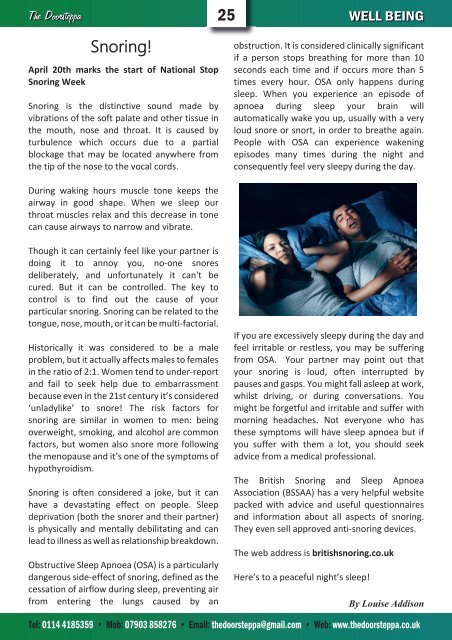Eckington & Killamarsh Doorsteppa April 20
You also want an ePaper? Increase the reach of your titles
YUMPU automatically turns print PDFs into web optimized ePapers that Google loves.
The <strong>Doorsteppa</strong><br />
25 WELL BEING<br />
<strong>April</strong> <strong>20</strong>th marks the start of National Stop<br />
Snoring Week<br />
Snoring is the distinctive sound made by<br />
vibrations of the soft palate and other tissue in<br />
the mouth, nose and throat. It is caused by<br />
turbulence which occurs due to a partial<br />
blockage that may be located anywhere from<br />
the tip of the nose to the vocal cords.<br />
obstruction. It is considered clinically significant<br />
if a person stops breathing for more than 10<br />
seconds each time and if occurs more than 5<br />
times every hour. OSA only happens during<br />
sleep. When you experience an episode of<br />
apnoea during sleep your brain will<br />
automatically wake you up, usually with a very<br />
loud snore or snort, in order to breathe again.<br />
People with OSA can experience wakening<br />
episodes many times during the night and<br />
consequently feel very sleepy during the day.<br />
During waking hours muscle tone keeps the<br />
airway in good shape. When we sleep our<br />
throat muscles relax and this decrease in tone<br />
can cause airways to narrow and vibrate.<br />
Though it can certainly feel like your partner is<br />
doing it to annoy you, no-one snores<br />
deliberately, and unfortunately it can't be<br />
cured. But it can be controlled. The key to<br />
control is to find out the cause of your<br />
particular snoring. Snoring can be related to the<br />
tongue, nose, mouth, or it can be multi-factorial.<br />
Historically it was considered to be a male<br />
problem, but it actually affects males to females<br />
in the ratio of 2:1. Women tend to under-report<br />
and fail to seek help due to embarrassment<br />
because even in the 21st century it’s considered<br />
‘unladylike’ to snore! The risk factors for<br />
snoring are similar in women to men: being<br />
overweight, smoking, and alcohol are common<br />
factors, but women also snore more following<br />
the menopause and it’s one of the symptoms of<br />
hypothyroidism.<br />
Snoring is often considered a joke, but it can<br />
have a devastating effect on people. Sleep<br />
deprivation (both the snorer and their partner)<br />
is physically and mentally debilitating and can<br />
lead to illness as well as relationship breakdown.<br />
Obstructive Sleep Apnoea (OSA) is a particularly<br />
dangerous side-effect of snoring, defined as the<br />
cessation of airflow during sleep, preventing air<br />
from entering the lungs caused by an<br />
If you are excessively sleepy during the day and<br />
feel irritable or restless, you may be suffering<br />
from OSA. Your partner may point out that<br />
your snoring is loud, often interrupted by<br />
pauses and gasps. You might fall asleep at work,<br />
whilst driving, or during conversations. You<br />
might be forgetful and irritable and suffer with<br />
morning headaches. Not everyone who has<br />
these symptoms will have sleep apnoea but if<br />
you suffer with them a lot, you should seek<br />
advice from a medical professional.<br />
The British Snoring and Sleep Apnoea<br />
Association (BSSAA) has a very helpful website<br />
packed with advice and useful questionnaires<br />
and information about all aspects of snoring.<br />
They even sell approved anti-snoring devices.<br />
The web address is britishsnoring.co.uk<br />
Here’s to a peaceful night’s sleep!<br />
By Louise Addison<br />
Tel: 0114 4185359 • Mob: 07903 858276 • Email: thedoorsteppa@gmail.com • Web: www.thedoorsteppa.co.uk

















